Trek Week, Part 5
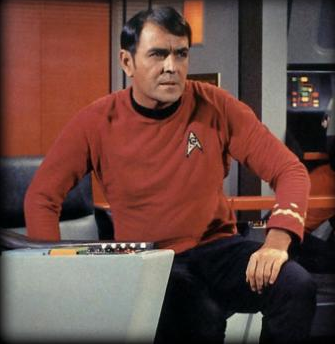 This week, the week of my birthday, I’ve been indulging myself by sharing all my thoughts about how I’d approach my dream job, being story editor on a reboot of the original Star Trek series. Yesterday I wrote about how I’d update the principal characters. Today I’ll talk about the rest of the characters and wrap things up.
This week, the week of my birthday, I’ve been indulging myself by sharing all my thoughts about how I’d approach my dream job, being story editor on a reboot of the original Star Trek series. Yesterday I wrote about how I’d update the principal characters. Today I’ll talk about the rest of the characters and wrap things up.
Mr. Scott
I think the writing of Mr. Scott is pretty straight forward in some ways. There’s not as much nuance necessary as there is with the principal characters. I love that line from the series bible about Scotty thinking of the ship as his and Kirk as merely the driver. He’s a gifted engineer and is constantly tasked with pulling off the impossible. I like the suggestion I’ve seen in various fan literature that he was there when the ship was being refitted, and that he might have served on the ship under a previous captain as well.
He’s a good friend and superior, loyal and compassionate to the men and women who serve under him. He seems to like Kirk and Spock but isn’t as informal with them as, say, McCoy – consider that in the entire series, all 79 episodes, only once did he ever call Kirk by his first name. These and other behaviors suggest that he’s a career military man.
In rebooting Scotty I think we’d leave him exactly the same, except we might want to tone down the number of times he says that the engines can’t take much more of it, and the like. In the original story bible it suggests that McCoy and he are actually pretty tight and unwind together off duty, but we never saw that. It might be interesting to see now and then.
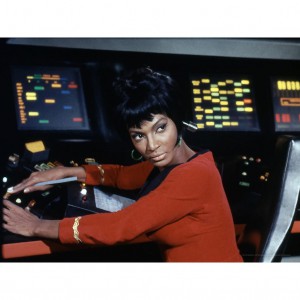 Lieutenant Uhura
Lieutenant Uhura
In the original series bible Uhura is third in the chain of command, right after Kirk and Spock, and above Sulu. Given that Scotty outranks her, I’d make her the senior bridge officer, which means that she could command when Kirk and Spock were away, but that Scott might sometimes be left in overall command when the captain and first officer were away for long periods. Cool as it was to see Scotty in charge in some really fine moments of the series (when Kirk was stranded on planet in “A Taste of Armageddon,” say), think how great it would have been if it was Lt. Uhura in the command chair!
When Spock’s making repairs you may note that it’s sometimes Uhura who he has assisting him. It’s implied that she’s capable and sturdy, and she even playfully banters with Spock, the only one of the junior officers who would dare to do so. Later she’s reduced to saying lines like “Captain, I’m frightened” and declaring that hailing frequencies are open. In a reboot, that former implied competence should be heightened and the other behavior dropped altogether.
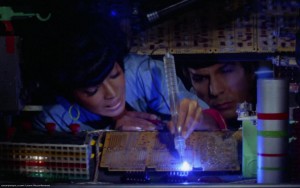 A lot of people objected to the relationship between Spock and Uhura shown in the reboot movies, but there’s actually some basis for it. Of course it was far more subtle in the original series, but then in the movies Spock suffered the complete destruction of his planet, so you can kind of understand his emotional need. In any case, in the original series there are several times when there’s some subdued flirting going on between the two. All that said, I’m not a big fan of a boyfriend/girlfriend relationship between them because it’s fraternization between the ranks, and both Uhura and Spock are, as I mentioned earlier on, professionals. In a TV reboot I’d recommend re-igniting the respect the two share for each other. Make Uhura the closest thing Spock has to a friend apart from Kirk and McCoy.
A lot of people objected to the relationship between Spock and Uhura shown in the reboot movies, but there’s actually some basis for it. Of course it was far more subtle in the original series, but then in the movies Spock suffered the complete destruction of his planet, so you can kind of understand his emotional need. In any case, in the original series there are several times when there’s some subdued flirting going on between the two. All that said, I’m not a big fan of a boyfriend/girlfriend relationship between them because it’s fraternization between the ranks, and both Uhura and Spock are, as I mentioned earlier on, professionals. In a TV reboot I’d recommend re-igniting the respect the two share for each other. Make Uhura the closest thing Spock has to a friend apart from Kirk and McCoy.
Uhura’s the head of an entire department, but she’s probably being groomed for command and being cycled through different posts to become acquainted with how all the departments work. It would be nice to see her competency in some other areas apart from communications, so long as she doesn’t become a ninja powered hand-to-hand killing machine, the cheap out anytime you want to show that a woman is competent.
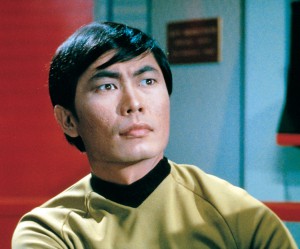 Lieutenant Sulu
Lieutenant Sulu
Although still somewhat exciteable – he’s a young officer and described in the series bible as changing hobbies about ever other week – Sulu is extremely reliable and capable, a promising young officer destined for a command of his own, well liked by his fellow junior officers and his superiors. As the series progressed we saw less and less of Sulu’s hobbies and Sulu during his downtime, but his essential portrayal as loyal and dependable always remained the same. In any reboot he should be the same guy and there would hopefully be more of an opportunity to get to know him better.
Incidentally, I was thrilled in the original series that Sulu was using a rapier, not a samurai sword. That was Takei’s idea, and I still love it. It broke the stereotype of Asian guy = must use oriental weapon. Why shouldn’t Sulu like D’artagnan over a samurai?
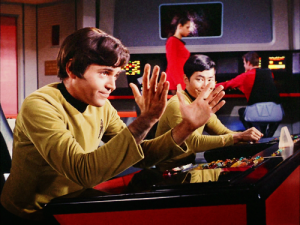 Ensign Chekov
Ensign Chekov
The story goes that Chekov was added in the second season because the Soviet Union’s Pravda newspaper complained there was no Russian character in the starship crew, although Chekov seems also to have been added to appeal to the youth market, hence the Monkee/Beatles haircut.
Chekov is more of a stereotype than the other characters, and his excessive pride in his Russian heritage is a running gag. I can see why the reboot writers made him extremely talented, which is a viable direction because we never got to know him that well. It seems as though he and Sulu are friends, and it likewise seems that he’s being groomed for various duties – witness him sometimes using Spock’s bridge scanner. Chekov would have to be expanded in a reboot. An impetuous and promising officer, but one who’s even younger and greener than Sulu. One who can more easily comment on how strange or exciting things are, and who can rise to responsibility.
Walter Koenig was told at the start of the third season that he was going to be getting more and more screen time and going forward would be treated like a young Kirk in training… but then the third season got moved to its lousy time slot and the producer got replaced and all those plans (along with episodes focused on secondary officers) never came to fruition. This abandoned plan might be a valid approach.
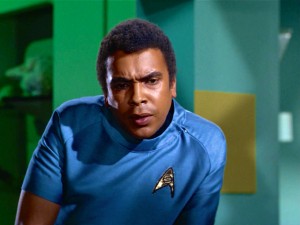 Other Characters
Other Characters
Nurse Chapel was rarely more than a walking gag about a crush on Spock. She’d need to be given a specialty and a lot more personality.
Yeoman Rand was ably played by Grace Lee Whitney, so I’m not knocking her. But the character really seemed to have been created to be a sex object, someone to whom the captain was attracted whom he could never touch. If she were to be retained, her character would have to about a lot more.
There were likewise some other repeat characters, the most memorable of whom were surely Transporter Chief Kyle, (John Winston did a lot with a very limited role) and Mr. Leslie. Before any other new characters were created it would be absolutely wonderful to see folks like these (and Kevin Riley and Mr. Desalle and Lt. Galloway and Dr. M’Benga, the Vulcan specialist) be occasional recurring characters.
Series Approach
It would be great to start a rebooted series with the launch of the Enterprise at the start of the five year mission under Kirk — but a Kirk who has earned that promotion through distinguishing himself multiple times serving aboard other vessels. One thing I liked about the movie reboot was that Kirk and Spock didn’t hit it off right away, and any reboot would likely cover their growing respect and then the development of their friendship. McCoy would probably have transferred over with Kirk, along with some of the other junior officers (Sulu, perhaps) but Scott, as I mentioned above, should be a long term member of the Enterprise crew. His devotion to the ship is an essential facet of his character.
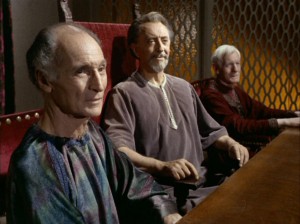 I’d plan for there eventually to be an Organian Peace Treaty from the original series– you know, the superior beings that impose the treaty upon the Klingons and the Federation — but I’d have it come a little later, say some time in season two, so we could have some more direct conflict between the two powers before things got more complicated.
I’d plan for there eventually to be an Organian Peace Treaty from the original series– you know, the superior beings that impose the treaty upon the Klingons and the Federation — but I’d have it come a little later, say some time in season two, so we could have some more direct conflict between the two powers before things got more complicated.
These days TV shows seem to have long running arcs, but it would be nice if these were kept primarily to the background and that the show remained true to its episodic nature. We’d see characters growing and changing, though – Kirk and Spock learning to trust one another, McCoy and Spock growing fond of each other despite the clashes, the crew becoming a well-oiled machine, Uhura, Sulu, and Chekov becoming better and better officers.
As to whether or not to redo old episodes, I’m of two minds. It might be really neat to re-film the best of the originals (or maybe to fix some of the iffy ones so they could fulfill their potential). On the other hand, if it was done great the first time, why re-record it?
As for where to get new stories, well, there are decades of Star Trek stories from various sources. While many of them are drek, there are some treasures out there, and a generation of writers who grew up, like me, wanting to tell new stories about our favorite crew.
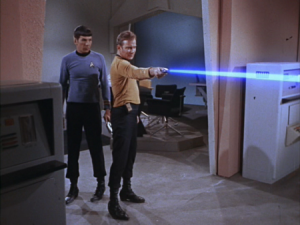 Final Words
Final Words
Well, there you have it, a whole lot of daydreaming. Anyone who’s a regular visitor knows me through some of my other interests, namely favorite writers, but this week people have gotten a full-on view of the obsessive Star Trek fan lurking behind this pleasant exterior.
Maybe a lot of us are composites of our various obsessions. I suppose I could have gone on for days about Badfinger, or The Beatles, or Hannibal of Carthage, or Harold Lamb — although I think I’ve written about him extensively enough elsewhere that it’s probably not necessary. (I wonder if you could chart a life by the things a person becomes fascinated with?)
Instead I talked with you about one of my earliest interests. I watched and re-watched and re-re-re-re-watched these episodes so much that I can walk into a room when one of them is starting and name the title within a second or two. But I’m not the only person with that superpower. There are a lot of us from my generation, and earlier, who can do that.
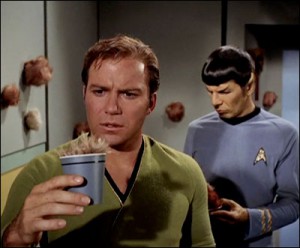 It has to be asked how feasible a Star Trek reboot could actually be. The original show was a product of its time, one that was less jaded and ironic. Again I’ll turn to Torie Atkinson’s essay over on The Viewscreen, which you should really read in full. (You should visit in any case because the reviews by Torie and Eugene Myers are always interesting and frequently insightful, as are many of the comments.) She writes that in the original Star Trek: “The characters had the courage to believe in the goodness of themselves and others, and to believe that with just a little ingenuity, they could overcome anything. There is so much passion in Trek, but it’s a bridled and mature passion. Kirk nearly bursts with the earnestness of his convictions, but his sincerity isn’t foolish or idle and his compassion doesn’t make him weak. They’re his strengths, and they make him a great leader (“The Enemy Within”). Why do we scorn these things today? We associate idealism, optimism, and sincerity with immaturity and youth, as if we must lose these things as adults—as if they’re no longer important or relevant.”
It has to be asked how feasible a Star Trek reboot could actually be. The original show was a product of its time, one that was less jaded and ironic. Again I’ll turn to Torie Atkinson’s essay over on The Viewscreen, which you should really read in full. (You should visit in any case because the reviews by Torie and Eugene Myers are always interesting and frequently insightful, as are many of the comments.) She writes that in the original Star Trek: “The characters had the courage to believe in the goodness of themselves and others, and to believe that with just a little ingenuity, they could overcome anything. There is so much passion in Trek, but it’s a bridled and mature passion. Kirk nearly bursts with the earnestness of his convictions, but his sincerity isn’t foolish or idle and his compassion doesn’t make him weak. They’re his strengths, and they make him a great leader (“The Enemy Within”). Why do we scorn these things today? We associate idealism, optimism, and sincerity with immaturity and youth, as if we must lose these things as adults—as if they’re no longer important or relevant.”
Do we think we’re too grown up for Star Trek today? It may be — yet the odd thing is that the reboot movies play down to us rather than up. They no longer seem aimed at mature people, and they don’t confront difficult ideas in a mature way. Part of that is because the requirements of a modern blockbuster movie mean explosions and action, but part of that is because there was a fundamental disconnect on the part of the men who made it about what made a story, and a character, Star Trek, as opposed to a generic science fiction show.
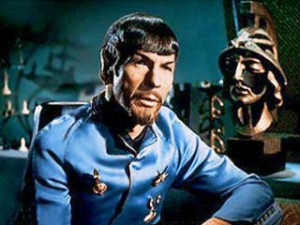 Forget about the plot flaws in the new movies (some are hard to forget, I know) because there were plenty of plot flaws in the original shows. Forget about how Kirk in the new movies was destined for the ship rather than earning it. I could forgive all of that (I could gripe, but forgive) if Kirk grew into the person he has to be to represent the best of us. But he’s just not the same guy, no matter how valiantly Christopher Pine tries, because the script won’t let him go there. He’s a milleniall hero for cinema, one interested in vengeance, not to mention one lacking Kirk’s innate compassion. He’s the new gritty dark Kirk, one step away from the version of Kirk in the popular imagination, the one mocked by comedians who shoots first and asks questions later and is always looking to bag the hot alien babe. He’s “better” because he’s allegedly more realistic.
Forget about the plot flaws in the new movies (some are hard to forget, I know) because there were plenty of plot flaws in the original shows. Forget about how Kirk in the new movies was destined for the ship rather than earning it. I could forgive all of that (I could gripe, but forgive) if Kirk grew into the person he has to be to represent the best of us. But he’s just not the same guy, no matter how valiantly Christopher Pine tries, because the script won’t let him go there. He’s a milleniall hero for cinema, one interested in vengeance, not to mention one lacking Kirk’s innate compassion. He’s the new gritty dark Kirk, one step away from the version of Kirk in the popular imagination, the one mocked by comedians who shoots first and asks questions later and is always looking to bag the hot alien babe. He’s “better” because he’s allegedly more realistic.
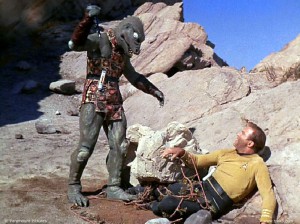 Will he and the rest of these characters grow into a closer semblance of the people I know and love? It may be. I can hope, because it seems that a lot of money was made and that these new hands will therefore be in charge of Star Trek for a while to come.
Will he and the rest of these characters grow into a closer semblance of the people I know and love? It may be. I can hope, because it seems that a lot of money was made and that these new hands will therefore be in charge of Star Trek for a while to come.
If this modern movie version of Star Trek can still be taken seriously, what about the other? And I don’t mean the one where the men’s uniforms look a little like pajamas, the one with the styrofoam rocks and the guys in suits playing the aliens. Okay, I do mean that show, but I specifically mean how the characters and the stories enabled us to see past the way it looked.
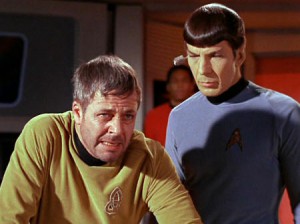 Could we have that show back? Updated not with grittiness and characters gleefully willing to kill, but updated to lose the obvious corn? You can’t lose it all, of course — how do you really make it realistic that there’s a guy from another planet who looks just like us apart from the ears? — but you can jettison the stuff that isn’t required by the feel and the characters we knew, and that’s what I’ve been talking about all this week.
Could we have that show back? Updated not with grittiness and characters gleefully willing to kill, but updated to lose the obvious corn? You can’t lose it all, of course — how do you really make it realistic that there’s a guy from another planet who looks just like us apart from the ears? — but you can jettison the stuff that isn’t required by the feel and the characters we knew, and that’s what I’ve been talking about all this week.
Finally, it must be asked whether there are still original Star Trek stories that are worth telling. The original series itself was running out of themes. Even if you ignore the ham-handed third season we were already seeing a lot of the same ideas cropping up again and again — parallel Earths, God-like aliens toying with the crew, computers that were destroying society, etc. Some variety in the formula could easily be introduced if it’s no longer necessary for Kirk to frequently have a lady to romance, and for him to always lead the landing party, sure, but are there really five years worth of sterling episodes possible even if you take the not necessarily wise step of recycling the best of them?
I’d be willing to bet that if you get the right people involved, those who really understood the feel and the characters, something amazing might happen.
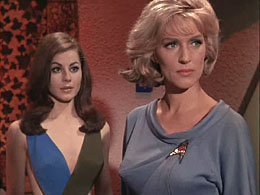 But then something amazing already did happen, and, warts and all, it is the original Star Trek. It was produced on a limited budget for a network that never really understood it, one that wanted some of the crew to smoke so tobacco companies would sponsor the show. Gene Roddenberry had to fight that idea, not to mention to get all those different ethnicities on the bridge, working together — wouldn’t a black woman alienate viewers in the south? And what was up with the satanic looking guy, the Vulcan? Did he really have to be there? (NBC airbrushed Nimoy’s pointed ears out of some of the early publicity shots — but SOME of these above claims, long pressed by Roddenberry, may not actually be accurate. According to memos presented by Marc Cushman in These Are the Voyages: TOS Season One, the network was actually far more progressive about all this than we’ve long been led to believe. I wrote this article before reading that book, however, so I’m letting it stand with this newly added disclaimer.)
But then something amazing already did happen, and, warts and all, it is the original Star Trek. It was produced on a limited budget for a network that never really understood it, one that wanted some of the crew to smoke so tobacco companies would sponsor the show. Gene Roddenberry had to fight that idea, not to mention to get all those different ethnicities on the bridge, working together — wouldn’t a black woman alienate viewers in the south? And what was up with the satanic looking guy, the Vulcan? Did he really have to be there? (NBC airbrushed Nimoy’s pointed ears out of some of the early publicity shots — but SOME of these above claims, long pressed by Roddenberry, may not actually be accurate. According to memos presented by Marc Cushman in These Are the Voyages: TOS Season One, the network was actually far more progressive about all this than we’ve long been led to believe. I wrote this article before reading that book, however, so I’m letting it stand with this newly added disclaimer.)
The show was made on such tight constraints it’s no wonder some of them don’t work — “Shore Leave” was pretty much revised on the set by Roddenberry himself and censors so completely gutted “The Alternative Factor” because of an interracial love story that it makes almost no coherent sense.
Taken in that context, and dogged as it was by all sorts of other turmoil you may or may not have heard about, it’s a wonder it gave us so many great things, or any good things, at all. Perhaps all we can really do is celebrate Star Trek for the tremendous achievement that it is.
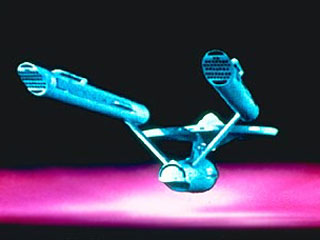 Because of the passing years it’s likely that future generations won’t be able to look past the dated depiction of the future and some of the ’60s cultural assumptions to see the intelligence and humanity there that made Star Trek a touchstone. I shall hope that something as fine is made for them. Perhaps some of you reading this might even help to create it.
Because of the passing years it’s likely that future generations won’t be able to look past the dated depiction of the future and some of the ’60s cultural assumptions to see the intelligence and humanity there that made Star Trek a touchstone. I shall hope that something as fine is made for them. Perhaps some of you reading this might even help to create it.
Return to the start of Trek week.
3 Comments